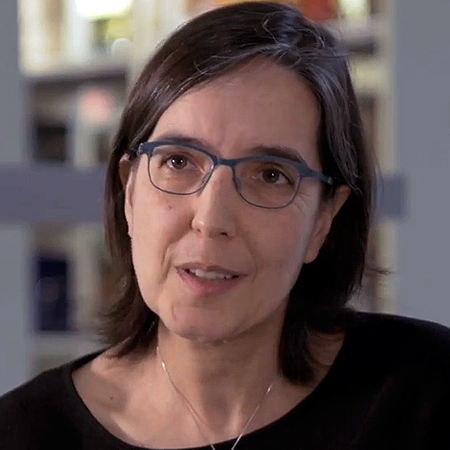ESPERANZA ALFONSO CARRO
ESPERANZA ALFONSO CARRO
Bio
M.A in Semitic Philology at the Universidad Complutense de Madrid (1993). Ph.D. in Hebrew Philology at the same University. I got two post-doc grants at the Center for Advanced Judaic Studies of the Pennsylvania University and at the Near Eastern Studies Department of the Cornell University.
Professional positions: Assistant Professor, Department of Hebrew and Semitic Studies, University of Wisconsin-Madison (2001-2005) and, Visiting Assistant Professor, Department of Near Eastern Studies, Cornell University, USA (on leave from the University of Wisconsin-Madison) (2004-2005). Upon my return to Spain, I worked as “Ramón y Canal” Research Fellow at the Department of Hebrew and Aramaic Studies, Universidad Complutense de Madrid (2006), and from 2008 as Tenured Research Fellow, CCHS-CSIC.
Some of my publications: Abd al-Ḥaqq al-Islāmī: Al-sayf al-mamdūd fī l-radd ‘alà aḥbār al-yahūd [Espada extendida para refutar a los sabios judíos] (Madrid: CSIC, 1998), and Islamic Culture through Jewish Eyes: Al-Andalus from the 10 th to the 12 th Century (London: Routledge, 2008). I have published a monograph of the Arab studies Journal Al Qantara (vol. 29, no. 2, 2008), about the sponsorship in the medieval Islamic societies and I have co-published other three volumes: with Ross Brann, a monograph of the journal Comparative Literature Studies (vol. 45, no. 2, 2008) about “Al-Andalus y sus legados”, with Carmen Caballero-Navas the collective book: Medieval Jewish Identities: Iberia and Beyond (New York: Palgrave-Mcmillan, 2010) and with Javier del Barco, M. Teresa Ortega-Monasterio and Arturo Prats the catalogue: Bibles of Sepharad/Biblias de Sefarad (Madrid: Biblioteca Nacional de España, 2012).
Between 2008 and 2012 I was the PI of the ERC project: “INTELEG”.
ERC Project “INTELEG: Intellectual and Material Legacies of Late Medieval Sephardic Judaism; an Interdisciplinary Approach”
From the 13 th to the 15 th centuries, the Jews of the Iberian Peninsula (Sepharad) lived side by side with Christians and Muslims. Although persistent tensions existed between these three groups, their members also participated in a common artistic, intellectual and scientific endeavour that produced the requisite conditions for the dawn of the European Renaissance. The worldviews of all three communities revolved around their sacred texts. This project takes as a focal point Judaism and its sacred text, and explores its role and impact in late medieval society at large.

Bio
M.A in Semitic Philology at the Universidad Complutense de Madrid (1993). Ph.D. in Hebrew Philology at the same University. I got two post-doc grants at the Center for Advanced Judaic Studies of the Pennsylvania University and at the Near Eastern Studies Department of the Cornell University.
Professional positions: Assistant Professor, Department of Hebrew and Semitic Studies, University of Wisconsin-Madison (2001-2005) and, Visiting Assistant Professor, Department of Near Eastern Studies, Cornell University, USA (on leave from the University of Wisconsin-Madison) (2004-2005). Upon my return to Spain, I worked as “Ramón y Canal” Research Fellow at the Department of Hebrew and Aramaic Studies, Universidad Complutense de Madrid (2006), and from 2008 as Tenured Research Fellow, CCHS-CSIC.
Some of my publications: Abd al-Ḥaqq al-Islāmī: Al-sayf al-mamdūd fī l-radd ‘alà aḥbār al-yahūd [Espada extendida para refutar a los sabios judíos] (Madrid: CSIC, 1998), and Islamic Culture through Jewish Eyes: Al-Andalus from the 10 th to the 12 th Century (London: Routledge, 2008). I have published a monograph of the Arab studies Journal Al Qantara (vol. 29, no. 2, 2008), about the sponsorship in the medieval Islamic societies and I have co-published other three volumes: with Ross Brann, a monograph of the journal Comparative Literature Studies (vol. 45, no. 2, 2008) about “Al-Andalus y sus legados”, with Carmen Caballero-Navas the collective book: Medieval Jewish Identities: Iberia and Beyond (New York: Palgrave-Mcmillan, 2010) and with Javier del Barco, M. Teresa Ortega-Monasterio and Arturo Prats the catalogue: Bibles of Sepharad/Biblias de Sefarad (Madrid: Biblioteca Nacional de España, 2012).
Between 2008 and 2012 I was the PI of the ERC project: “INTELEG”.
ERC Project “INTELEG: Intellectual and Material Legacies of Late Medieval Sephardic Judaism; an Interdisciplinary Approach”
From the 13 th to the 15 th centuries, the Jews of the Iberian Peninsula (Sepharad) lived side by side with Christians and Muslims. Although persistent tensions existed between these three groups, their members also participated in a common artistic, intellectual and scientific endeavour that produced the requisite conditions for the dawn of the European Renaissance. The worldviews of all three communities revolved around their sacred texts. This project takes as a focal point Judaism and its sacred text, and explores its role and impact in late medieval society at large.


